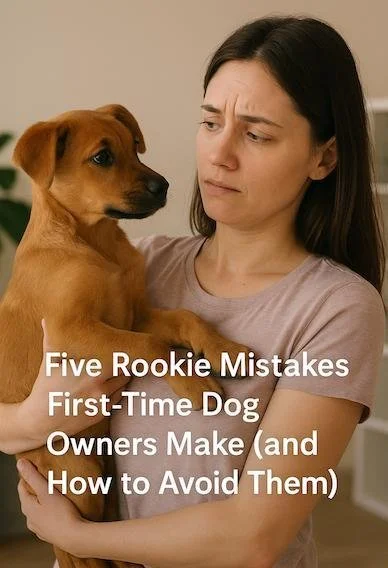Five Rookie Mistakes First-Time Dog Owners Make (and How to Avoid Them)
First Time Dog Owner Mistakes
For the audio version of these blog posts, tune into the USA Dog Behavior Podcast.
Bringing home a new dog is exciting, but first-time owners often discover the learning curve is steeper than they expected. After working with hundreds of families, I’ve noticed I approach first-time owners very differently than experienced ones — not because they aren’t intelligent, or lack commitment or care, but because they’re sometimes working from assumptions that just don’t match how dogs actually learn.
Here's a quick perspective on this issue. I was a guest on an animal behavior podcast recently when the host spoke about how working with first time dog owners can be challenging. I reminded her that all of us, including me, were also first-time dog owners once. We all have a learning curve.
Here are five of the most common beginner mistakes and what to do instead.
1. Believing a dog “knows better”
Many new owners interpret unwanted behavior as intentional disobedience. In reality, dogs don’t operate from guilt, spite, or moral awareness. They operate from reinforcement history and habit. If a dog jumps, pulls, steals food, or barks excessively, it’s because the behavior has worked for them in some way. Framing behavior as a learning issue — not a character issue — opens the door to real progress.
2. Rewarding problem behaviors without realizing it
A brand-new dog owner might say “I don’t reward the jumping,” but is simultaneously petting the dog to calm it down. Or they pull a barking dog closer while trying to soothe them. These kinds of things reinforce unwanted behaviors. Reinforcement isn’t about intention; it’s about what the dog perceives as rewarding. Once an owner understands this, we can build new reinforcement patterns that support calmer behavior.
[This article is original content created by USA Dog Behavior (https://www.usadogbehavior.com) and is intended for our readers.]
3. Assuming socialization means “meeting lots of dogs”
A big misunderstanding. Proper socialization is about exposure to a variety of environments, sounds, surfaces, people, and controlled interactions — not letting every dog run up and say hello. Over-socialization in chaotic settings can actually create reactivity or insecurities later. Quality over quantity makes the difference.
4. Expecting dogs to “grow out of” problematic behavior
First-time owners often hope their dog will mature past the issues. Unfortunately, dogs grow into patterns, not out of them. If a young dog practices pulling, barking at windows, or resource guarding, those behaviors strengthen with repetition. Early course correction is always easier than trying to undo months of unwanted habits.
5. Underestimating the value of structure
Experienced owners usually understand daily structure is calming to dogs. First-timers often give a new dog tons of freedom right away — roaming the house, greeting everyone, sleeping wherever, and choosing their own pace. While well-intentioned, this can create anxiety and confusion. Clear patterns (routines, boundaries, predictable interactions) help dogs settle faster and behave more confidently.
Final Thoughts
None of these mistakes come from laziness, lack of intelligence or lack of love. They’re simply assumptions people often make when they’re new to the world of dog behavior. Once owners understand how dogs think and learn, things get easier — fast. A little education up front can save months of frustration and create a smoother, happier relationship from day one.
For the audio version of these blog posts, tune into the USA Dog Behavior Podcast.
© 2025 Scott Sheaffer. All rights reserved. Original content. Reproduction prohibited.

